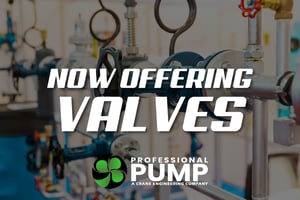Wastewater treatment plants have complex systems that rely on a number of components to function...
Choosing the Right Valve for Your Pumping System
Selecting the correct valve for your pumping system is critical for optimal performance, efficiency, and longevity of your fluid handling system. The wrong valve can lead to reduced flow, increased energy consumption, costly repairs, and potential system failures.
Understanding Your Application
Understanding the specific needs of your pumping application is essential. Factors such as the type of fluid being pumped – whether it's water, oil, chemicals, or slurries – are important. Corrosive fluids require valves made from materials like stainless steel that can withstand their chemical properties. Similarly, the temperature of the fluid significantly impacts valve material selection and performance.
The operating pressure of the system is another key factor. Valves must be able to withstand the pressures within the pumping system to prevent leaks and failures. Additionally, the desired flow rate determines the necessary valve size. An undersized valve can restrict flow, leading to reduced system efficiency and potential pump damage. Conversely, an oversized valve can introduce unnecessary complexity and expense.
Common Valve Types
Several valve types are commonly used in pumping systems, each with its own strengths and weaknesses.
- Ball valves are excellent for on/off control and offer low pressure drop, making them suitable for a wide range of general-purpose pumping applications.
- Butterfly valves are lightweight and cost-effective for on/off control. However, they may experience higher pressure drop compared to ball valves.
- Check valves are essential for preventing backflow, protecting pumps from damage and ensuring proper fluid flow direction.
- Globe valves offer precise control over flow rate, making them ideal for throttling and regulating applications. However, they generally have higher pressure drops compared to ball and butterfly valves.
Valve Material Considerations
The choice of valve materials is equally important. Stainless steel is a popular choice for various fluids due to its corrosion resistance. Brass is often used in water and low-pressure applications, while cast iron offers durability and cost-effectiveness for general-purpose applications. In certain cases, plastic valves may be suitable for corrosive fluids and low-pressure applications.
Determining Valve Size
To make sure your pumping system works smoothly, you need to choose the right size valve. The flow coefficient (Cv) helps determine the appropriate valve size based on the desired flow rate. Selecting the correct size valve helps prevent the valve from blocking flow or causing too much pressure loss.
Maintenance Considerations
Finally, maintenance considerations should not be overlooked. Valves should be easily accessible for inspection, maintenance, and repair to minimize downtime and ensure continued system reliability. Choosing materials that are resistant to corrosion and regularly inspecting for leaks can significantly extend the lifespan of your valves.
Contact Professional Pump for Expert Guidance
Selecting the optimal valve for your specific pumping application can be a complex process. Our team of experts at Professional Pump possesses the knowledge and experience to guide you through the selection process, ensuring you choose the right valves for your unique needs.



